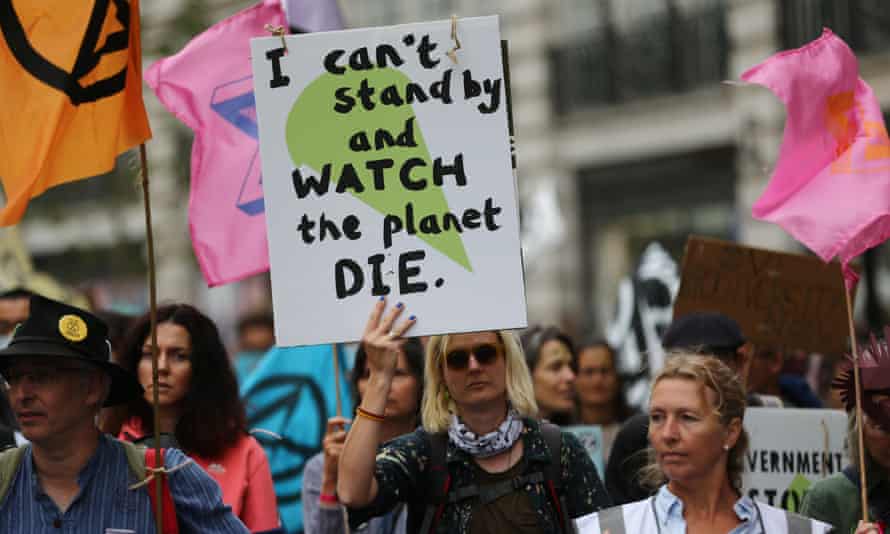Extract from The Guardian
As Cop26 meeting approaches, analysis shows world is on track for 3C temperature increase if present trends continue.

The climate crisis group Extinction Rebellion march through central London, 4 Sep 2021.
Last modified on Thu 16 Sep 2021 03.01 AEST
Every one of the world’s leading economies, including all the countries that make up the G20, is failing to meet commitments made in the landmark Paris agreement in order to stave off climate catastrophe, a damning new analysis has found.
Less than two months before crucial United Nations climate talks take place in Scotland, none of the largest greenhouse gas emitting countries have made sufficient plans to lower pollution to meet what they agreed to in the 2015 Paris climate accord.
This means the world is barreling towards calamitous climate impacts.
Under the Paris deal, nations vowed to prevent the world’s average temperature rising 1.5C above pre-industrial times in order to avoid disastrous heatwaves, flooding, storms, drought and other consequences that are already starting to unfold. But the new analysis, by Climate Action Tracker, finds almost every country is falling woefully short of that commitment.
The US, the European Union bloc, Germany and Japan are ranked as “insufficient”, while the UK, the host of the upcoming climate summit, is “almost sufficient”.
Of the 36 countries, plus the EU, ranked by the Climate Action Tracker only the Gambia has made commitments in line with the 1.5C Paris goal. Combined, these countries make up 80% of global emissions.
Governments are supposed to periodically improve their emissions reduction targets in order to fulfil the promises made in Paris but progress has “stalled” this year, the researchers said.
There was “good momentum” in May after a climate summit held at the White House by the US president, Joe Biden, according to Niklas Höhne, a researcher at NewClimate Institute, a partner organization in the Climate Action Tracker analysis.
“But since then, there has been little to no improvement – nothing is moving,” he said. “Governments have now closed the gap by up to 15%, a minimal improvement since May.
“Anyone would think they have all the time in the world, when in fact the opposite is the case,” he added.
This intransigence comes despite the looming climate talks and increasing signs of the climate crisis manifesting itself in catastrophic weather events, including massive floods in Germany and China, severe wildfires in the US and dangerous heatwaves sweeping several countries.
A survey of 16,000 people across North America, Europe and Asia on Tuesday by Pew found that 72% were worried that climate change will harm them personally at some point.
In August, a landmark report by the Intergovernmental Panel on Climate Change, the world’s leading authority on climate science, found that the burning of fossil fuels is changing the Earth’s climate in “unprecedented” ways and that rapid cuts in greenhouse gases are needed to avert climate breakdown.
António Guterres, the UN secretary general, said the report should act as “a code red for humanity”.
But the Climate Action Tracker found a lack of urgency by all of the major emitters, such as China, India and the US, in responding to this threat.
Even countries with strong climate targets are not on track to meet them, while international finance for poorer countries to help cope with the climate crisis is falling short. If current practices continue, the world is on track for nearly 3C in warming.
The analysis said of “particular concern” are the governments of Australia, Brazil, Indonesia and Russia, all of which have failed to raise the ambition of their emissions cuts at all since 2015.
Coal, the most polluting fossil fuel, is still being developed on a large scale by India and China, the report found, while gas infrastructure is being expanded by Australia and the EU.
“An increasing number of people around the world are suffering from ever more severe and frequent impacts of climate change, yet government action continues to lag behind what is needed,” said Bill Hare, chief executive of Climate Analytics, another partner in the new study.
“While many governments have committed to net zero, without near-term action achieving net zero is virtually impossible.”
The analysis provides a sobering reality check ahead of the UN climate talks, which were pushed back from last year due to the Covid-19 pandemic. A coalition of 1,000 environment groups have called for the talks to be postponed again because delegates from the poorest countries still lack access to coronavirus vaccines.
This call has been rejected by the British government as well as John Kerry, the US climate envoy, who said on Monday that a further delay would be a “huge, huge mistake”.
But Kerry risks entering the talks with no major climate victory to brandish, with emissions reduction provisions as part of a huge $3.5tn piece of Biden’s legislative agenda still a matter of disagreement even among Democrats in the US Congress.
Environmentalists have also attacked the Biden administration for recently leasing out vast areas of the US west and the Gulf of Mexico for oil and gas drilling.
The leases “will make it even harder for America to meet its climate goals”, said Jennifer Rokala, executive director for the Center for Western Priorities conservation group.
“Vision is nothing without action. Unfortunately, the Biden administration’s actions to increase drilling on public lands are at odds with the president’s vision,” she added.
No comments:
Post a Comment